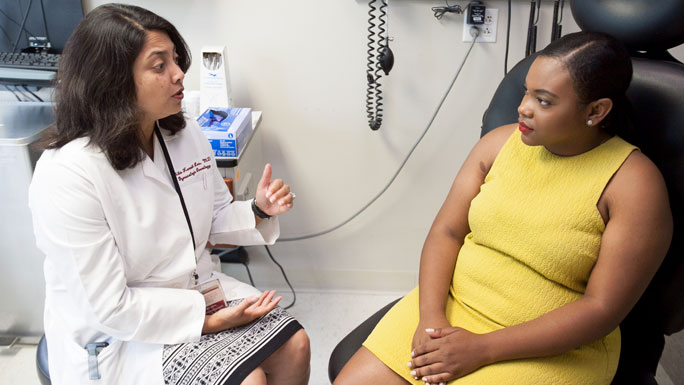Cervical Cancer

At the University of Chicago Medicine, our gynecologic oncology team offers a wide range of treatments for patients of all ages with early and advanced stages of cervical cancer. Our team provides a holistic approach based on each patient’s stage, cell type and fertility considerations. We also collaborate with a multidisciplinary team of cancer experts, including some of the most experienced and medical oncologists and radiation oncologists in the country, to determine the best possible treatment plan. In addition, we consider fertility sparing and preservation options and collaborate with our colleagues in reproductive endocrinology to consider options for oncofertility, egg retrieval and banking.
The cervix is the lower, narrow end of the uterus (the hollow, pear-shaped organ where a fetus grows) that connects the uterus to the vagina. Cervical cancer usually develops slowly. Before cancer appears in the cervix, abnormal cells begin to grow in the cervical tissue. Over time, they may become cancer cells and spread more deeply into the cervix and to other tissues and organs of the body. Because this type of cancer is often slow-growing, there are many opportunities for prevention, early detection and treatment.
The vast majority of cervical cancers are caused by persistent infection with high-risk human papillomavirus (HPV) types. HPV is a very common condition, affecting many who are sexually active. Most are able to clear the infection, but for some, it persists. A vaccine is available to prevent HPV in males and females. Learn more about the HPV vaccine from UChicago Medicine gynecologic oncologist Nita Karnik-Lee, MD, MPH.
Many women with cervical cancer may not have not had regular cervical cancer screenings with a Pap smear or HPV test. Major risk factors for developing cervical cancer include having sexual intercourse at an early age, having multiple sexual partners, not having access to Pap smears and/or HPV tests, not following up after abnormal testing, or immunocompromised conditions such as a history of transplant or HIV.
The most common cell type of cervical cancer is squamous cell carcinoma (cancer in the tissue lining surface of the cervix), which accounts for 80 percent of cervical cancers. Fifteen to 20 percent of patients have cervical adenocarcinoma, which starts higher in the cervical canal and is more difficult to detect on Pap smears. Another more rare type of cervical cancer is cervical clear cell carcinoma, which was originally identified and studied at UChicago Medicine. This type is associated with exposure in utero to diethylstilbestrol (DES), an estrogen medication that is no longer used in pregnancy.
Most women diagnosed with precancerous changes in the cervix are in their 20s and 30s, but the average age of women diagnosed with cervical cancer is between 30 and 50 years old. Importantly, more than 15 percent may be older than 65.
The first line of prevention for cervical cancer is the HPV vaccine, which targets high-risk HPV types that can cause cancer. The vaccine is recommended for boys and girls starting when they are 11 or 12 years old — before they are sexually active. It can be given to men and women up to the age of 45. Even with the vaccine, however, regular screening is the standard of care.
For women who have not received the vaccine, the best method of preventing cervical cancer is to keep up with regular gynecologic checkups and screenings with Pap smear and HPV tests.
An early diagnosis of cervical cancer is key to successful treatment. If abnormal cells are found on a Pap smear or if you have high-risk HPV, the following tests may be used to detect and diagnose cervical cancer:
- Clinical exam to visualize the cervix
- Colposcopy is a procedure using a type of microscope to inspect the cervix and take small biopsies (tissue samples). This is commonly performed in a gynecologist's office.
- Excisional biopsy removes a larger tissue sample from a section of the cervix for both diagnosis and possible treatment of dysplasia (abnormal cells found on or around the cervix). There are two types of excisional biopsy procedures:
- Loop electrosurgical excision (LEEP) uses an electrified loop of wire to take a tissue sample for biopsy. This can be performed in a gynecologist's office or as an outpatient procedure.
- Cervical cone biopsy (conization) removes a portion of the cervix, using a scalpel or laser, for biopsy. This is performed in the operating room under anesthesia.
If biopsy results show invasive cancer, a series of tests including exams or diagnostic imaging may be performed to see how far the cancer has spread and to better understand the cell type. Based on the results, our multidisciplinary team of cancer experts works with the patient to create a personalized treatment plan, which takes into account her stage, age and options for fertility.
Treatment may include a combination of these options:
- Surgery, to remove the cancerous tissue, including minimally invasive, fertility-sparing surgery or radical hysterectomy with or without preservation of the ovaries
- Chemotherapy, the use of powerful drugs to kill cancer cells
- Radiation therapy, the use of high-energy rays to damage cancer cells and stop their growth
- Targeted therapy, the use of drugs or other substances to identify and attack specific cancer cells while limiting the harm done to normal cells
- Clinical trials of new therapies
Very early cervical cancers can often be treated surgically with open or minimally invasive techniques, such as vaginal hysterectomy or cone biopsy. For select patients interested in preserving their ability to have a baby, we offer radical fertility-sparing options as well. UChicago Medicine is also one of the few hospitals nationwide — and the only one in Illinois — to offer radical vaginal trachelectomy, a fertility-sparing treatment option. Our expert team is able to remove the cancer and the cervix while preserving the uterus, allowing young women with select early cervical cancers a chance to conceive and carry a baby to term.
For locally advanced cancers, chemoradiation is used for treatment and cure. We work closely with our colleagues in radiation oncology to provide state-of-the-art radiation therapy, including specialized intensity modulated radiation therapy (IMRT), for women with cervical cancer. IMRT allows our radiation oncologists to fully target the tumor area while better sparing normal tissue in the rest of the body. This helps reduce side effects on bowel and bladder function.
UChicago Medicine was the first medical center in Chicago to provide IMRT to its patients. Initial studies done here eventually established this as a national standard of treatment. In addition, our center is one of the few centers offering further specialized local radiation with interstitial brachytherapy. During this treatment, needle devices containing radioactive material are temporarily inserted directly into the cervix tissue through soft, slender tubes called catheters. This technique provides the high dose of radiation required to control cervical cancer without causing undue side effects, such as damage to surrounding organs. Our team has built on the use of interstitial therapy by also using image guided brachytherapy to help reduce toxicity to adjacent organs and focus on targeted treatment of the tumor.
Cervical cancer is more difficult to treat after it has spread to distant parts of the body (metastasized). We offer comprehensive care and management of patients with advanced disease or recurrent disease using chemotherapy and the latest advances in clinical trials. UChicago researchers are continuously testing new drugs that may be more effective in treating cervical cancer than currently available options. We also have performed many clinical trials combining chemotherapy and radiotherapy with the goal of improving survival for women fighting this disease. We are one of the few sites in the geographic area that offer adaptive immunotherapy trials for cervical cancer. Learn more about our cervical cancer clinical trials.
Recognized as a Leader in Cancer & Gynecologic Care
We are one of only two National Cancer Institute-designated Comprehensive Cancer Centers in Illinois. U.S. News & World Report consistently ranks UChicago Medicine's cancer program among the top in the United States. Several of our faculty are recognized annually by Chicago magazine as Top Cancer Doctors.
Leading Research
UChicago Medicine's Comprehensive Cancer Center is a leader in the research and treatment of gynecological cancers, including cervical cancer. Our research areas include clinical trial development using chemotherapy, targeted agents and immunotherapy; clinical outcomes in chemoradiation; and supportive therapies.

Cancer Care Second Opinions
Request a second opinion from UChicago Medicine experts in cancer care.

Participate in a Cervical Cancer Clinical Trial
UChicago Medicine cervical cancer experts are actively conducting clinical trials of new and promising treatments.

Program in Integrative Sexual Medicine (PRISM) for Women & Girls with Cancer
PRISM is a program designed to identify, prevent and treat sexual health problems in female cancer patients and survivors.
